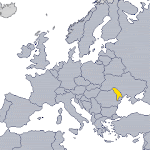I have bought a few things while in Moldova, but one of my larger purchases to date was a toaster. My host mother makes some pretty amazing breakfast sandwiches (I think a past volunteer taught her how to make them) with eggs, bacon/smoked sausage, cheese, greens and spicy ketchup. Usually she fries the bread in oil to make toast, so I thought that I would buy a toaster which would help me eat less oil and be a little healthier in the long run… plus I do enjoy toast.
Before I bought this toaster I had been to grocery stores, small shops, a second hand store and large open markets, but this was my first time in an Electronic store.
The grocery stores in the capital are much like US stores, except you have to put your large bags/backpacks in lockers (much like a bookstore on a college campus) to limit theft. But otherwise it is the same, clean stores, clearly marked items, multiple checkout counters and you can pay with cash or credit cards.
There are many small shops and they carry the same sort of supplies as many gas stations in the US (besides gas). You can buy bread, some canned vegetables, smoked meat, frozen meat, candy, beer, fish and other things like that. Usually the options are fairly limited, but generally where ever you are, you never have to walk more than ten minutes to find the local store. Generally, other than drinks, you must ask for what you want to buy because most everything is behind the counter, which was frustrating until I was more comfortable with Romanian. The majority do not accept credit cards in the city and you probably will not find anywhere in a village with credit card capability.
Large open markets are a lot of fun if you are not leading a large group and/or there are not too many people around. At the central market in the center of the capital is large and you can buy anything from glue to bicycles, tea to meat and purses to china plates. There are many vendors who all seem to sell the same thing, I do not know how people make any money with so much competition.
The electronic store I visited had almost all of their products in the back of the store. It took me a little while to figure out that I had to ask the salesman to go in the back to get the product. He then filled out a slip of paper and I had to take it to the front of the store to pay, then I took the receipt back to the salesman. The other interesting thing was that they opened everything that was purchased to check if it was working. The salesman unpacked the toaster and plugged it in to see if it worked. Unlike in the US where you have to mail stuff to the maker for a warranty the store personally guaranteed the toaster, so I signed a form, they stamped the date on it and attached the receipt. So if there are any problems, I just bring the toaster and the receipt to get it fixed/replaced.
Leia Mais…












